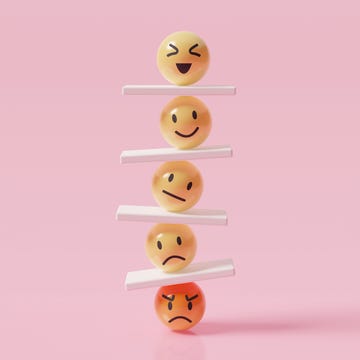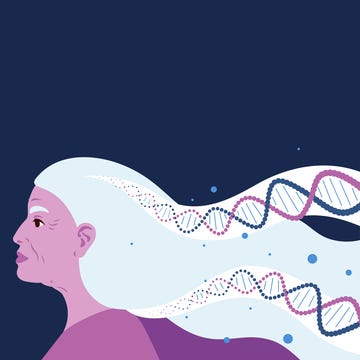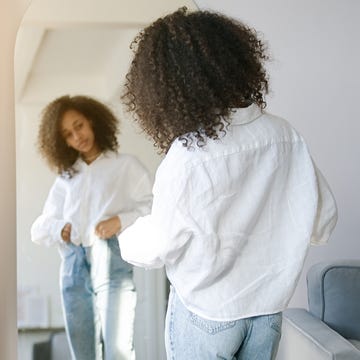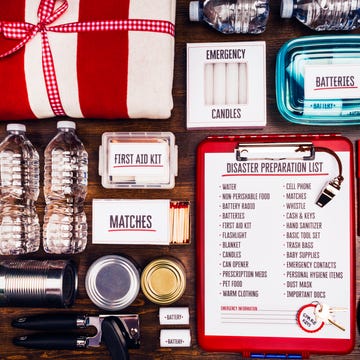I was in university when I saw my first pair of knitting needles outside of a Tweety Bird cartoon. One classmate had taken to knitting during lectures — and then another, and another, until the entire campus was filled with recreational knitters.
I begged a friend who was already great at making her own hats and jumpers to take me shopping for wool so I could try it myself. She patiently taught me how to cast on and showed me the stitches. After days of working on my new scarf, I stepped back to take a look at my progress. It (unintentionally) looked like a whale's tail, much thicker at the bottom than the top, and had a ragged edge. Wait, I was supposed to count every stitch carefully and make sure the rows were all uniform? Whoops. I pulled my handiwork off the needles and donated all my supplies to a friend.
My short time spent as a knitter was not all for naught, even if I never achieved mastery. I learned a new skill, which was good for my brain. I strengthened my friendships, spending face-to-face time with the friend who tried to teach me, my roommate who was learning how to knit at the same time I was and the eventual recipient of all my supplies. And I could see how knitting would be beneficial during a lecture, slowing down the brain and giving the hands something to do to stay occupied.
These benefits, and others, might be what's behind a resurgence in what could be called "grandma hobbies," like crochet, bird-watching, gardening, baking and other cosy pursuits. I've even heard building adult LEGO sets categorised as a "grandma hobby" — it does get builders into the same relaxed state as knitters.
And there are plenty of reasons to take one up. "When people immerse themselves in a hobby, they often find an escape from daily pressures, creating a calming space where they can unwind and recharge," says Patricia S. Dixon, a clinical psychologist. "As they hone their skills, they may experience a boost in self-confidence. Additionally, if the hobby presents a challenge, it encourages cognitive growth and problem-solving. And participating in a shared interest can lead to meaningful social interactions, enhancing feelings of belonging and connection." And that's just the beginning of the benefits of grandma hobbies.
Learning a new hobby can be a brain boost.
This is especially true of cosy hobbies, which often have a mind-body connection. "It prompts the brain to engage in different ways, stimulating new thought patterns and cognitive processes," Dr. Dixon says. "Research shows that learning new skills — such as playing a musical instrument or picking up a new language — can enhance cognitive function and memory. This engagement promotes neuroplasticity, the brain's remarkable ability to reorganise itself by forming new neural connections." She adds that hobbies are also associated with a reduced risk of dementia and cognitive decline in older adults, while hobbyists of all ages are shown to have improved focus.
"Research tells us that knitters report that it can help with concentration and attention, and that many knitters find that it helps them to process their thoughts or to solve problems," says Mia Hobbs, a clinical psychologist who offers the course "Self-Care One Stitch at a Time" for knitters who want to learn how to more intentionally use their hobby for their wellbeing.
The brain benefits of cosy hobbies can go beyond a lengthened attention span, too. Dr. Hobbs describes a newer therapeutic technique called EMDR (Eye Movement Desensitisation and Reprocessing), which uses bilateral movements — those that stimulate both sides of the brain — to help process traumatic experiences. "It has been suggested that one of the reasons that knitters find it so therapeutic is because the bilateral movements may be helping our brains to process difficult experiences," she says. "Imagine having a hobby that could be helping you to process the difficult events of each day while you create a beautiful new sweater!"
Grandma hobbies can be good for mental health, too.
Imagine the pride that comes with finishing a new knitting project. (I have to imagine it, since I never finished mine.)
In that way, cosy hobbies are a good-feelings factory. "Having a sense of meaning and accomplishment are other great ways to boost wellbeing," says Emma Palmer-Cooper, a research psychologist in the UK. "Setting personal goals to work towards in any area of life, including cosy hobbies, provides purpose to our pleasures. Whether you're learning a new craft or challenging yourself to with a new pattern, working towards goals and feeling accomplished boosts self-esteem, positive emotions and overall wellbeing."
Hobbies don't just keep the good feelings coming — they wash away the bad, too. "Engaging in activities we truly enjoy helps build resilience — the ability to adapt to challenges and manage stress," Dr. Palmer-Cooper adds. "When we are fully absorbed in a creative task, we can enter a state of 'flow,' where we focus entirely on the present moment rather than dwelling on the past or worrying about the future. This level of engagement leads to greater life satisfaction and productivity." My classmates who brought their knitting to lectures were really onto something.
Hobbies strengthen your social network.
Sure, you can knit, sew, bake and garden on your own. But delving into a hobby will probably bring you in contact with other hobbyists, be it through friends who engage in each activity as a group, online communities with tips and tricks or the weak ties you meet at the craft shop.
"Research has shown that knitters who knit as part of a group are more likely to report feeling calmer and happier after knitting, and that knitters often rate their social connections as one of the key benefits of knitting," Dr. Hobbs says. "Knitters also speak about using knitting to connect to loved ones, family and culture by carrying on traditional crafts or by creating gifts for loved ones."
"Engaging with like-minded individuals fosters a sense of connection based on shared interests, which is especially valuable in today’s technology-driven world that often leaves people feeling isolated," Dr. Dixon adds. "It can motivate you to improve and deepen your skills, creating an environment of mutual growth." Plus, more time spent on a hobby means there's fewer minutes in the day devoted to doomscrolling and social media, which is also a mood-improver.
Research shows there are benefits to grandma hobbies.
Science is on the hobbyists' side. In addition to the benefits of knitting outlined by Dr. Hobbs above, studies show the benefits of these grandma hobbies.
- Bird-Watching: A 2022 study published in Scientific Reports notes that seeing and hearing birds in everyday life offers significant mental health benefits, both in people with depression and in people without.
- Clay Art: Different studies have found that clay art therapy is good for both treating depression in adults and reducing anxiety in college students.
- Crochet: In a 2021 study published in Perspect Public Health (aptly titled "Happy Hookers"), crocheting was determined to be a "relatively low-cost, portable activity" that can "play a role in promoting positive wellbeing in the general population."
- Drawing: A 2019 study found that even just 10 minutes of drawing per day can boost mood, and that the benefits compound if the artist does it for at least a month.
- Gardening: One 2020 study from Princeton University says that gardening gave people the same level of happiness and wellbeing as biking, walking or dining out, and that "home gardening was among the top five activities in terms of how meaningful an activity felt to people while engaging in it." In addition a study out of Kansas Sate University says that gardening is a brain-body helper, and "older adults can, among other things, improve their hand strength and self-esteem at the same time."
So while I'll never have a wardrobe of fibre art made with my own two hands, I have found that I actually enjoy tending to a set of flower boxes that I keep on my porch. And seeing the seeds sprout does give me a sense of ease, and maybe a jolt of pride.













